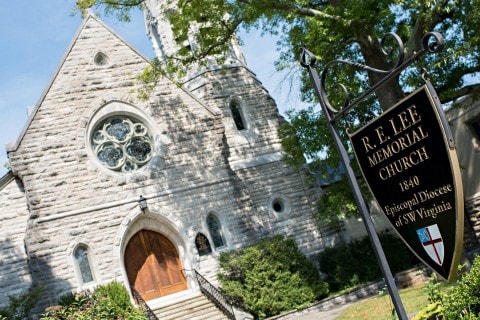Tensions over the name of the Robert E. Lee Memorial church in Lexington, VA continue to rise in the wake of a white supremacist rally and deadly violence in nearby Charlottesville. Their has been sharp disagreement over the the name of the parish, whose name was changed from Grace Church to R.E. Lee Memorial in 1903, decades after the death of the Confederate general and former Senior Warden. At least one vestry member has resigned over that body’s intransigence on changing the parish’s name.
From ENS
“Anne Hansen, who helped craft the statement Monday, resigned from the vestry afterward because church leaders would not commit more definitively to discussing a name change.
“My hope had been that if we could make a unified statement, say something unanimously … that we would be able to move from there into further action in a consensual way [regarding] the implications of our association with Lee,” Hansen said in an interview with ENS. “At the vestry meeting, that became apparent to me that was not going to happen.” She added that she blamed herself for getting upset and not articulating her views clearly enough.
The vestry’s inaction on the issue is fueling tension inside and outside the congregation, creating an unnecessary distraction for the church, Southwest Virginia Bishop Mark Bourlakas told Episcopal News Service. He favors the name change.
“The name has become not only a distraction to their Gospel mission, but … it’s dividing parishioners and causing all kinds of rancor,” said Bourlakas, who plans to visit the congregation this month to assist in reconciliation efforts. “My priority is to heal the congregation, and I don’t believe that that healing can occur while the name stays the same.”
The discussion didn’t resume in a significant way until the violence in Charlottesville raised concerns again about how Lee had come to be a symbol of white supremacist ideology.”
The rising tide of public opinion against honoring Confederates is causing some of those in favor of such memorials to harden their attitudes. vestry member, A.W. “Buster” Lewis, who has been a vocal opponent of changing the name said back in March that he believed he and the church were under attack. But many now see these memorials for the signposts of white supremacy they were always intended to be, and Bishop Bourlakas fears these symbols are antithetical to the gospel and are markers of unwelcome; that Charlottesville marks a point of no return in how these memorials are seen and understood.
“We’re in a different moment since Charlottesville,” Bourlakas said. “These symbols have become too toxic. We’re a church that cares deeply about sacraments and symbols, and this symbol, whatever you might think of it or what it represented, has been co-opted and has become toxic.”
Hansen, though, fears it may be too late. “We had already missed our opportunity to change the name of the church in a deliberative proactive way on our own terms,” she said.

